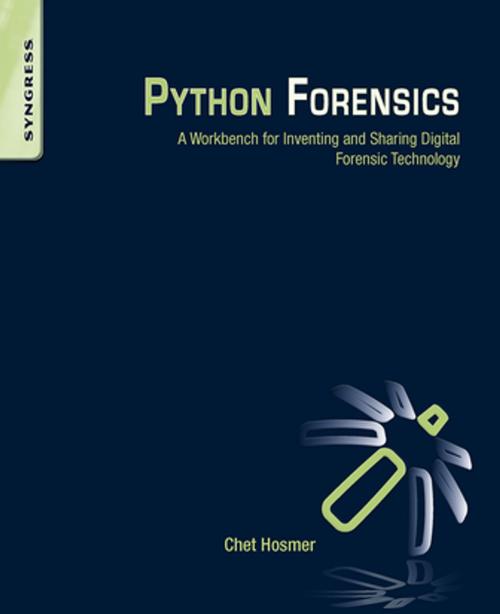Python Forensics
A Workbench for Inventing and Sharing Digital Forensic Technology
Nonfiction, Computers, Internet, Security, General Computing, Programming| Author: | Chet Hosmer | ISBN: | 9780124186835 |
| Publisher: | Elsevier Science | Publication: | May 19, 2014 |
| Imprint: | Syngress | Language: | English |
| Author: | Chet Hosmer |
| ISBN: | 9780124186835 |
| Publisher: | Elsevier Science |
| Publication: | May 19, 2014 |
| Imprint: | Syngress |
| Language: | English |
Python Forensics provides many never-before-published proven forensic modules, libraries, and solutions that can be used right out of the box. In addition, detailed instruction and documentation provided with the code samples will allow even novice Python programmers to add their own unique twists or use the models presented to build new solutions.
Rapid development of new cybercrime investigation tools is an essential ingredient in virtually every case and environment. Whether you are performing post-mortem investigation, executing live triage, extracting evidence from mobile devices or cloud services, or you are collecting and processing evidence from a network, Python forensic implementations can fill in the gaps.
Drawing upon years of practical experience and using numerous examples and illustrative code samples, author Chet Hosmer discusses how to:
-
Develop new forensic solutions independent of large vendor software release schedules
-
Participate in an open-source workbench that facilitates direct involvement in the design and implementation of new methods that augment or replace existing tools
-
Advance your career by creating new solutions along with the construction of cutting-edge automation solutions to solve old problems
-
Provides hands-on tools, code samples, and detailed instruction and documentation that can be put to use immediately
-
Discusses how to create a Python forensics workbench
-
Covers effective forensic searching and indexing using Python
-
Shows how to use Python to examine mobile device operating systems: iOS, Android, and Windows 8
-
Presents complete coverage of how to use Python scripts for network investigation
Python Forensics provides many never-before-published proven forensic modules, libraries, and solutions that can be used right out of the box. In addition, detailed instruction and documentation provided with the code samples will allow even novice Python programmers to add their own unique twists or use the models presented to build new solutions.
Rapid development of new cybercrime investigation tools is an essential ingredient in virtually every case and environment. Whether you are performing post-mortem investigation, executing live triage, extracting evidence from mobile devices or cloud services, or you are collecting and processing evidence from a network, Python forensic implementations can fill in the gaps.
Drawing upon years of practical experience and using numerous examples and illustrative code samples, author Chet Hosmer discusses how to:
-
Develop new forensic solutions independent of large vendor software release schedules
-
Participate in an open-source workbench that facilitates direct involvement in the design and implementation of new methods that augment or replace existing tools
-
Advance your career by creating new solutions along with the construction of cutting-edge automation solutions to solve old problems
-
Provides hands-on tools, code samples, and detailed instruction and documentation that can be put to use immediately
-
Discusses how to create a Python forensics workbench
-
Covers effective forensic searching and indexing using Python
-
Shows how to use Python to examine mobile device operating systems: iOS, Android, and Windows 8
-
Presents complete coverage of how to use Python scripts for network investigation















